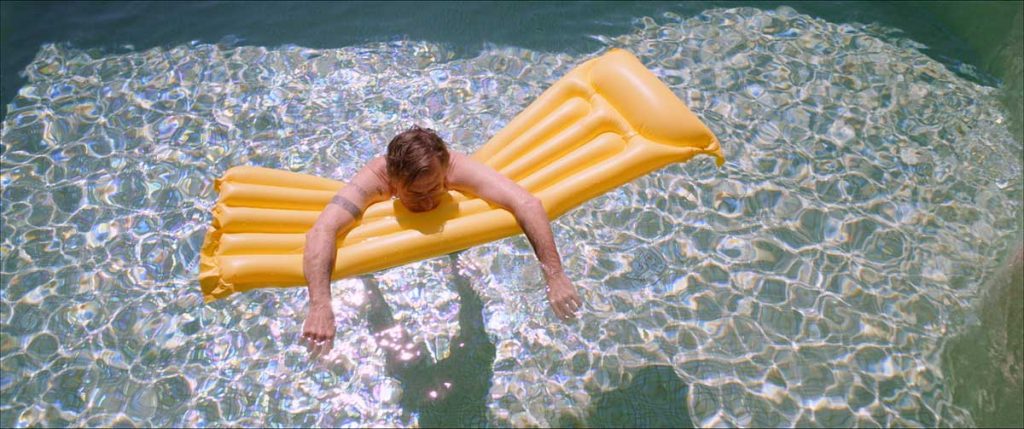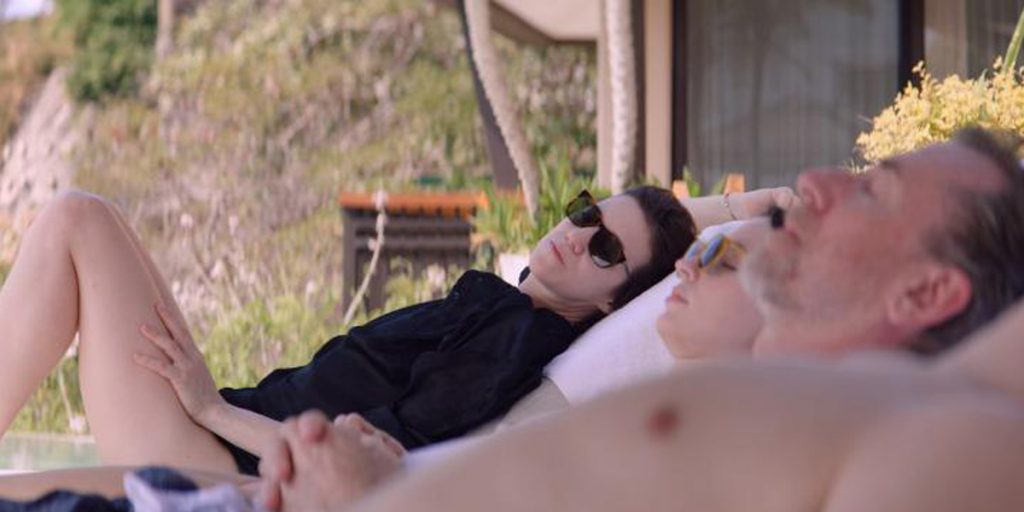Sundown is a story of sun, sex and shirked responsibility – Michel Franco’s challenging tale of hedonism and neglect starring Tim Roth and Charlotte Gainsbourg.
Tim Roth (Pulp Fiction) and Charlotte Gainsbourg (Nymphomaniac) play Neil and Alice, siblings who are forced to cut short their holiday in Acapulco to attend their mother’s funeral. Upon arriving at the airport gates, with the plane about to stop boarding, Neil appears to have left his passport at the hotel. He tells his sister and aloof twenty-something niece and nephew to take the lead, and that will catch up with them a couple of days later. Somehow, we sense that he cannot be trusted as he takes a relaxed journey back to the hotel, and it soon becomes clear that he’s not making any effort to find his passport. The rest of the film mostly follows Neil’s simple hedonistic pursuits, which mostly involve slouching in the sun, drinking beer and having sex with locals.
Despite running, without credits, less than 80 minutes, Sundown feels a lot longer. Three of the best films of last year – Shiva Baby, Petite Maman and Keyboard Fantasies – deftly told wonderful stories in even less time than Sundown. Shiva Baby was funny and thrilling, Petite Maman cute and moving, and Keyboard Fantasies informative and life-affirming. I cannot ascribe any such positive descriptors to Sundown. It feels so excruciatingly long because it has very little to say beyond perhaps ‘rich people are bad’, and unfortunately the characters and conflict aren’t compelling at all.
While the plot does move forward, it is mostly driven by cheap shock value that punctuates repetitive scenes in which Neil makes small talk with local women (as he wants to sleep with them) and lounges around with a beer in hand. Most of this shock value consists of extreme violence, as we learn that the resort is not very safe. None of Neil’s conversations are particularly insightful, and any observations he makes just simply aren’t interesting, because they mostly revolve around the same topics – namely alcohol, the sun and occasionally sex. Neil stays at the beach shirking his responsibility, and when his concerned sister calls him to ask how he is faring with getting his passport, he either ignores the call or lies to her. After the airport scene, the two siblings are only in the same room in one subsequent key scene, for most of their interactions are over the phone. Had the film delved into issues of alcohol and sex addiction, or introduced a believable conflict between the two siblings, it would have been much more compelling, but very little characterisation is given to either of them and, as such, it’s difficult to engage with them.
Stories about negative themes like nihilism and hedonism do not have to be boring. Think about how sad and thought-provoking Irreversible was, or how witty and exhilarating Naked was, despite its despicable protagonist. How fun was The Beach Bum? Because Neil and Alice are so devoid of personality, they just aren’t compelling at all. This is not at all the fault of Roth or Gainsbourg – they are trying their best with a limited script. They’re not even archetypes. Neil is acting in a totally selfish way by neglecting and lying to his family, but I struggled even to identify with them. Not a lot is asked of him at all, and we aren’t given much reason to sympathise with him. Without going into spoilers, the ending can be seen a mile off, yet it’s hinted at very obviously right at the beginning of the film and never touched upon again until right at the end. The ending somewhat clears things up as to his possible motivations, but by that point you’ll probably have lost interest.

For some films set and shot in beautiful retreats, you can feel the cast and crew’s enjoyment of their surroundings, and we can sometimes enjoy them vicariously. As bad as Adam Sandler’s Grown-Ups was, at least he and his friends were clearly having a good time making it. Here, nothing shines through at all. It presents itself with the relaxed confidence of a Haneke film (and I wouldn’t be surprised if Happy End was an inspiration) but brings none of the social commentary or pathos. It doesn’t even make good use of the beautiful setting, and while it is billed as a satire, doesn’t imbue any of its characters with personality at all. Imagine The White Lotus but without any of the intrigue, intelligence or visual beauty, and you’ve got Sundown.
The filmmaking feels very assured, but doesn’t really amount to much. The cinematography is remarkably bland, and fails to really take advantage of the beautiful natural surroundings beyond the occasional establishing shot. The dialogue is uninteresting, and there are a handful of attempts at dry humour that simply fall flat. Editing-wise, it focuses too much on Neil’s exploits and not enough on Alice, so it’s difficult to care about her as Gainsbourg is not afforded the ability to develop her character due to the lack of screen time. The performances aren’t compelling at all, but given the weak material the actors have been given, that comes as no surprise.
Despite an intriguing premise, Sundown fails to capitalise on its potential and the film is so muddled that it’s difficult to ultimately divine what it’s trying to do. Unfortunately it’s neither very funny nor insightful and it’s hard to care about the characters, given the lack of dimensionality they are written with.
Bleecker Street will release Sundown in select theaters starting January 28th, and on Digital Platforms on February 17th, 2022.

